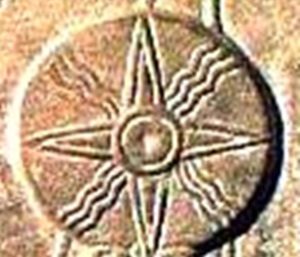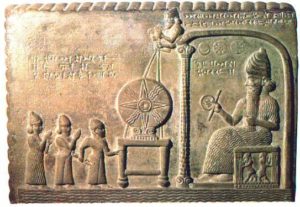The Four Rivers
Genesis 2:10 And a river went out of Eden to water the garden; and from thence it was parted, and became into four heads.
Interpretation:
The river that went out of Eden had formed from the mist that had emanated from the Sea of emotions and had watered the whole face of the ground.
The four rivers began as a spring in the centre of Eden and from there they were divided into four, one for each corner of the earth.
The four heads (separated rivers) represent the four basic characteristics that form personality. They are usually referred to as the four primal instincts. In the Book of Revelation; Chapter 4 and other places, they are referred to as the four beasts or four powers.
In Chapter 6 of Revelation, they are the four horses upon which the man rides, i.e. on which the man is carried. The man takes on the character of each beast and is then symbolized as; a lion, a calf, the face of a man, and an eagle. These symbols represent domination, desire, ignorance, and death. These things will be fully explained when I interpret the Book of Revelation.
The four rivers can also be seen in a stone relief of the Sun God Utu Shamash.


This means the knowledge of Self and Mind has been in the world and disguised by metaphors and symbols for thousands of years.
Genesis 2:11 The name of the first is Pison: that is it which compasseth the whole land of Havilah, where there is gold.
Interpretation:
It should be realized that the river that came out of Eden is the Self’s desire which has four powers, (also referred to as beasts). They are referred to as beasts because in the beginning they are uncontrollable. It is the man’s mission to tame these beasts and make them righteous. Only then will the Self accept them and experience the true life and power of a God.
The first river (Pison) is the power that is first given to the man, and it is willpower which is the power to dominate. The symbol for this man is the lion.
The strength of will is dependent on the strength of desire. It is the Self’s uncontrollable will that must be conquered.
Havilah is a reference to giving birth, and so refers to the surface of the earth from which the man was born, in other words the garden eastwards in Eden.
Gold is the symbol for knowledge of Truth.
Genesis 2:12 And the gold of that land is good: there is bdellium and the onyx stone.
Interpretation:
The term good means righteous and pleasurable. It should be noted that not all righteous knowledge is pleasurable, in fact sometimes it can be bitter. But here it is all righteous and pleasurable.
Bdellium is an aromatic gum from a tree, a tear of resin that liquefies when the Sun shines on it. Think of it as a perfume that relates to a pleasant atmosphere when the knowledge is warmed by desire.
Onyx stone is the colour of a man’s fingernail or claw and it represents the destructive power of will. That which is destroyed can be good or evil.
Genesis 2:13 And the name of the second river is Gihon: the same is it that compasseth the whole land of Ethiopia.
Interpretation:
The second river (Gihon) represents the power of desire, and the symbol for this man here is a calf. It is one thing to have willpower, but without desire what would you do with it?
The meaning of Gihon is; to burst forth and also quite frequently a child from the womb. The key is that life doesn’t begin until desire begins, in other words, if the Self only possessed willpower, life would have no meaning. Therefore the meaning of life is to pursue and experience pleasure.
Ethiopia is a reference to strong desire without the light of understanding.
Genesis 2:14 And the name of the third river is Hiddekel: that is it which goeth toward the east of Assyria. And the fourth river is Euphrates.
Interpretation:
The third river/beast/power is named Hiddekel, which in Hebrew means; to prick, to sting, to split, to separate. This power is referred to in places such as the Gospel of Mary as ignorance. Its symbol is the face of a man. It is the power to ignore what is good and right when pursuing pleasure.
The Euphrates is east of Assyria and so Hiddekel is said to go towards the Euphrates.
The fourth and last river on the journey is the Euphrates, which is the single most dominant of the rivers. Its symbol is the Eagle which is the symbol of a conqueror. What must be considered here is; what has been conquered and what has the Self become? Has the Self found wisdom or has it become foolish? Has the Self found eternal life or death? Will the Self keep this image of itself, or will the image be destroyed and a new life journey begin with a new man made from the earth?
The Euphrates is a place of judgement where the powers and the spirits are judged against their originals, which were good and righteous.
Understandable
POWERFUL WISDOM AND KNOWELGE, WITH
UNDERSTANDING.
THANK YOU.
BE BLESSED.